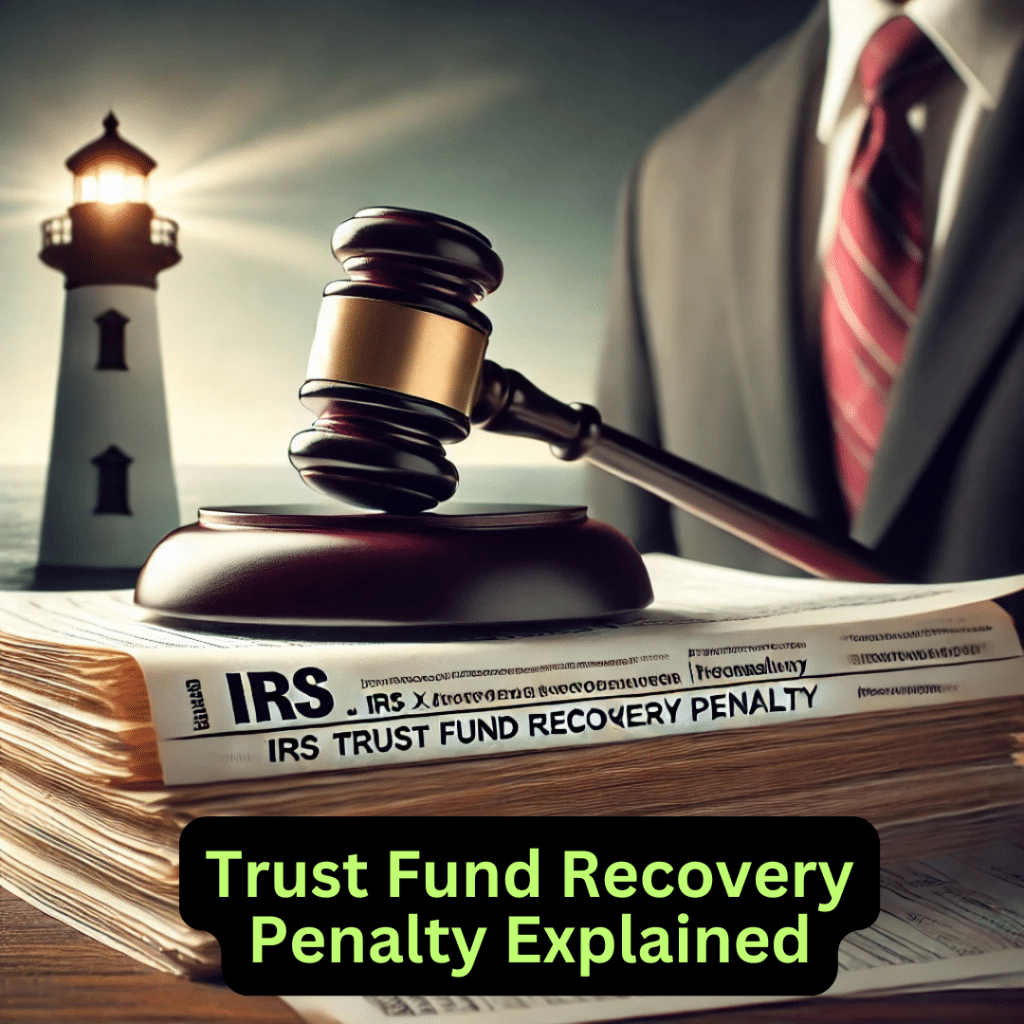
375 North Main Street Suite A-5
Williamstown NJ 08094
(856) 226-9524
mike@pinkharbor.com
Mon - Fri 9 AM - 5 PM
Night & Weekend Hours by Appointment

Williamstown NJ 08094
mike@pinkharbor.com
Night & Weekend Hours by Appointment
The IRS Trust Fund Recovery Penalty (TFRP) is a significant penalty for unpaid trust fund taxes, including withheld income taxes and employee Social Security contributions.
If you are facing a TFRP assessment, Pink Harbor, CPA is here to help you navigate the process, understand your trust fund tax liability, and protect your financial future.
Trust our expertise to guide you through resolving these complex IRS matters with confidence.

The IRS Trust Fund Recovery Penalty (TFRP) is a penalty assessed against individuals who are responsible for withholding and paying over certain taxes but fail to do so.
Specifically, this penalty is related to trust fund taxes, which include amounts withheld from employee wages, such as federal income taxes and Federal Insurance Contributions Act (FICA) taxes. Under Internal Revenue Code Section 6672(a), the penalty is equal to the total amount of the unpaid trust fund taxes.
Things You Need to KNOW About The Trust Fund Recovery Penalty
FREQUENTLY ASKED QUESTIONS ABOUT THE TRUST FUND RECOVERY PENALTY
The IRS determines responsibility and willfulness for the TFRP by evaluating an individual’s role and actions in a business.
Responsibility refers to whether the individual had the authority or control over financial decisions, including paying creditors or taxes. Willfulness is established if the individual knowingly failed to pay the taxes or acted with reckless disregard. According to Howard v. United States, 711 F.2d 729 (5th Cir. 1983), willfulness does not require intent to defraud but only a voluntary and conscious decision not to remit trust fund taxes.
Trust fund taxes are taxes withheld by businesses from employees’ paychecks on behalf of the government. These include federal income tax, and taxes on Social Security and Medicare.
The Internal Revenue Manual (IRM) 5.7.3.2 emphasizes that trust fund taxes are not the employer’s property but are held in trust for the United States.
The amount of the Trust Fund Recovery Penalty (TFRP) is calculated as the unpaid portion of the trust fund taxes.
The penalty does not apply to the employer’s share of these taxes. This calculation is outlined in IRC Section 6672(a) and is confirmed during the investigation process.
The process for assessing the Trust Fund Recovery Penalty (TFRP) involves an investigation by the IRS to identify responsible individuals and establish willfulness.
The IRS first interviews potentially responsible persons using Form 4180, “Report of Interview with Individual Relative to Trust Fund Recovery Penalty.” After gathering evidence, the IRS issues Letter 1153, which informs the individual of the proposed assessment and provides the opportunity to appeal through IRS Appeals.
Yes, multiple individuals can be assessed the Trust Fund Recovery Penalty (TFRP) for the same liability if the IRS determines that each person was responsible and acted willfully.
However, the government can only collect the full liability once, regardless of the number of individuals assessed. The joint and several liability principle is supported by Slodov v. United States, 436 U.S. 238 (1978).
Yes, there is a statute of limitations for assessing and collecting the Trust Fund Recovery Penalty (TFRP). Under IRC Section 6501(a), the IRS typically has three years from the date the tax return was filed (or should have been filed) to assess the penalty.
For collection, IRC Section 6502 provides a ten-year period from the date the TFRP was assessed.
Yes, the Trust Fund Recovery Penalty (TFRP) can be abated or appealed. An individual can request abatement if they believe the assessment was incorrect or if they were not responsible or willful.
Appeals can be filed through the IRS Independent Office of Appeals or contested in federal court. IRC Section 6672(d) allows for a refund claim to be filed after partial payment of the penalty.
The Trust Fund Recovery Penalty (TFRP) statute of limitations refers to the legal deadlines for the IRS to assess and collect the penalty.
Assessment must occur within three years per IRC Section 6501, and collection must be completed within ten years of the assessment date under IRC Section 6502.
A Trust Fund Recovery Penalty responsible person is someone who has control over the business’s financial affairs and decision-making, especially regarding the payment of taxes.
This person can include officers, directors, or employees. The IRM 5.7.3.3 defines responsibility broadly to encompass anyone who has the authority to direct the use of funds.
Pink Harbor, CPA offers a variety of IRS tax resolution services designed to help you manage and resolve tax issues. Below are some of the most effective solutions available:
| ✔️ IRS Offer-in-Compromise | Settle your tax debt for less than the full amount owed, based on your financial situation. |
| ✔️ IRS Installment Plans | Spread out your tax payments over time with an installment agreement, making it easier to pay off your debt. |
| ✔️ Filing Back Taxes – Tax Compliance | Ensure compliance by filing past-due tax returns and addressing penalties for late filing. |
| ✔️ IRS Innocent Spouse Relief | Avoid liability for tax debt if your spouse is solely responsible for incorrect or fraudulent reporting. |
| ✔️ IRS Injured Spouse Relief | Reclaim your share of a tax refund that was applied to your spouse’s past debts, such as child support or student loans. |
| ✔️ IRS Penalty & Interest Abatement | Reduce or eliminate IRS penalties and interest if you can prove reasonable cause for late payments or filings. |
| ✔️ IRS Currently Not Collectible Status | Temporarily delay IRS collection activities if you are unable to pay your tax debt due to financial hardship. |
Pink Harbor, CPA provides expert help to resolve a wide range of tax issues. Some of the most common problems we can assist with include:
| 🛡️ IRS Audit Representation | Get professional representation during an IRS audit to ensure your rights are protected and you receive fair treatment. |
| 🛡️ IRS Lien Withdrawal | Remove a tax lien placed on your property and restore your financial standing with the IRS. |
| 🛡️ IRS Levy Release | Stop the IRS from seizing your assets, such as bank accounts or wages, to pay off tax debt. |
| 🛡️ IRS Wage Garnishment Release | Protect your paycheck by stopping or reducing wage garnishment by the IRS. |
| 🛡️ IRS Trust Fund Recovery Relief | Resolve tax issues related to unpaid payroll taxes or trust fund penalties, often incurred by business owners. |
